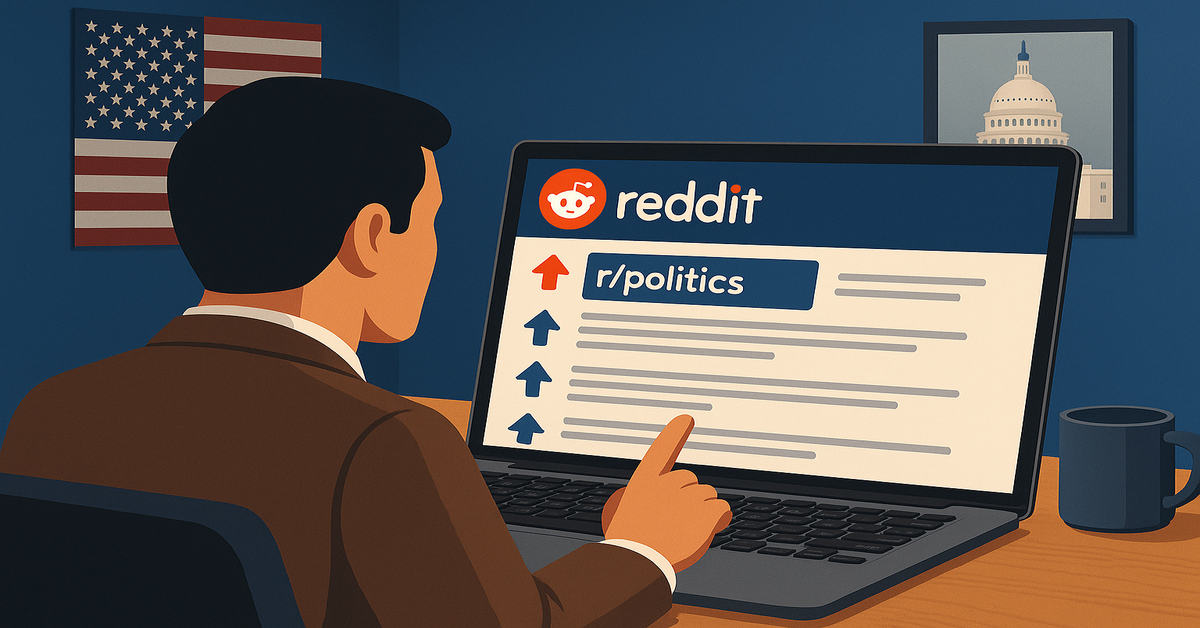
In the ever-changing landscape of online discussion, communities form around common interests and shared values. Some of these communities are lighthearted, focusing on hobbies, entertainment, or niche interests, while others tackle some of the most complex and pressing issues of our time. Among the most prominent political forums on the internet today is r/politics, a subreddit within the Reddit ecosystem. With millions of subscribers and a constant stream of new posts, r/politics functions as both a barometer of public sentiment and a battleground of ideas.
Unlike formal media outlets or political organizations, r/politics is built on user-generated content, democratic participation, and community rules. This combination creates a unique environment where news articles, commentary, debates, and memes coexist. To understand r/politics is to examine not just an online forum but the way digital communities shape political discourse in the 21st century.
In this extensive article, we will explore r/politics in depth: its origins, growth, community structure, posting trends, cultural influence, controversies, and broader significance in global political conversation.
What Is r/politics?
At its core, r/politics is a subreddit dedicated to political news and discussion. Reddit, as a platform, organizes itself into thousands of such communities (subreddits), each centered on a specific topic. r/politics stands as one of the largest and most active subreddits, with membership that rivals or surpasses many traditional online forums.
The subreddit primarily focuses on U.S. politics, though international stories occasionally surface when they intersect with American interests or global events of major consequence. Posts typically include links to news articles, original commentary, political cartoons, and discussions about government policy, elections, and current events. The voting system—upvotes and downvotes—determines which content rises to the top of the feed, shaping what users see most prominently.
Historical Background
Reddit itself launched in 2005, and r/politics quickly emerged as one of its foundational communities. In its early years, the subreddit was smaller and more experimental, functioning as a digital meeting point for politically engaged internet users. As Reddit grew, particularly in the early 2010s, r/politics expanded alongside it, eventually becoming a central hub for breaking news and political analysis.
During major elections—such as the 2008, 2016, and 2020 U.S. presidential races—the subreddit experienced massive surges in activity. It became a place where users not only shared news but also vented frustrations, celebrated victories, and engaged in heated debates. Over time, r/politics evolved from being a broad-based political forum into one with a clear leaning, shaped by its user base and moderation policies.
Structure and Community Rules
The success of any subreddit depends on its rules and moderation practices. r/politics is no exception. Moderators enforce guidelines that dictate what kind of content is acceptable and how users should behave. Key rules include:
- Focus on News: Most submissions must link to news articles or original reporting. Opinion pieces are often restricted.
- Civility: Harassment, hate speech, and personal attacks are prohibited.
- Relevance: Posts must relate directly to politics, primarily U.S. politics.
- No Reposts or Spam: Duplicate articles or promotional links are removed.
Moderators rely on both automated tools (like AutoModerator) and manual review to enforce these standards. While this creates consistency, it also sparks debates about bias, censorship, and fairness.
Membership and Demographics
r/politics boasts millions of subscribers, making it one of the largest political forums in the world. Its membership is diverse in age, background, and geography, though surveys and observation suggest a few key trends:
- Age Group: Many users are in the 18–34 range, reflecting Reddit’s overall younger demographic.
- Geographic Focus: A large percentage of users are from the United States, though international users contribute as well.
- Political Leaning: While open to all, r/politics often leans progressive or left-leaning due to community voting patterns.
This demographic composition shapes the tone of discussion, the types of articles that rise to the top, and the culture of the community.
Types of Content on r/politics
The subreddit features a wide range of political content. Some common categories include:
- Breaking News Articles: When major events occur—such as Supreme Court rulings, election results, or international crises—users quickly post relevant links.
- Legislation Updates: Posts often track bills moving through Congress or state legislatures.
- Election Coverage: Candidate announcements, campaign rallies, debates, and poll results dominate during election cycles.
- Commentary and Analysis: While official opinion pieces may be restricted, users frequently add their own insights in the comments.
- Political Memes and Cartoons: Humor and satire add a lighter tone to otherwise serious discussions.
- Activism and Calls to Action: Occasionally, users post about protests, petitions, or civic engagement efforts.
Table: Typical Post Types and Their Impact
| Post Type | Examples | Community Impact |
|---|---|---|
| Breaking News | Election results, court rulings | Drives immediate engagement and discussion |
| Policy Updates | Healthcare bills, climate laws | Sparks deeper debate and analysis |
| International Events | Wars, treaties, global summits | Adds global perspective to U.S.-focused feed |
| Memes and Satire | Political cartoons, parody headlines | Provides comic relief, enhances virality |
| Opinion and Commentary | User explanations, context in comments | Fosters community learning and argument |
Community Dynamics
The energy of r/politics lies in its comment sections, where thousands of users respond to posts. These discussions can range from highly analytical debates to emotional outpourings. Voting mechanics mean that the most popular or well-articulated comments rise to the top, shaping the tone of the thread.
However, the size of the community also means that disagreements, trolling, and hostility can appear. Moderators play a crucial role in keeping discussions civil, though challenges remain. For many users, the vibrancy of r/politics lies precisely in this mix of passionate engagement and constant exchange of ideas.
Influence on Political Discourse
r/politics wields significant cultural influence. Journalists, researchers, and politicians themselves occasionally monitor the subreddit to gauge public sentiment. The rapid posting of breaking news means that r/politics often functions as a real-time aggregator, rivaling news websites in immediacy.
In addition, memes and narratives that originate on r/politics sometimes spread to other platforms like Twitter, Facebook, or mainstream news outlets. The subreddit reflects not just what is happening in politics but also how everyday internet users interpret events.
Controversies and Criticisms
Like any large online community, r/politics has faced controversies:
- Accusations of Bias: Critics argue that moderation leans toward progressive content, sidelining conservative voices.
- Censorship Concerns: Some users feel that restrictions on opinion pieces limit the breadth of debate.
- Trolling and Brigading: External groups sometimes flood threads to influence discussions or push agendas.
- Misinformation Risks: Despite rules, inaccurate or misleading headlines occasionally make it to the front page.
These issues highlight the challenges of maintaining a massive, open-access political forum.
Comparisons with Other Political Communities
To understand r/politics better, it helps to compare it with similar platforms:
| Community/Platform | Focus | Strengths | Weaknesses |
|---|---|---|---|
| r/politics | General U.S. political news | Large, active, fast updates | Accusations of bias, moderation debates |
| r/worldpolitics | Global politics | International perspective | Smaller, less consistent activity |
| Twitter (X) Politics | Real-time news & opinions | Immediate, high-profile voices | Character limits, toxicity |
| Facebook Groups | Local and international politics | Community-based, varied perspectives | Echo chambers, misinformation |
| Dedicated Forums | Specific ideologies | Deep discussions, niche focus | Lack of diversity, smaller reach |
This comparison shows r/politics’ unique role as a broad, U.S.-focused hub that combines immediacy with community engagement.
The Future of r/politics
Looking ahead, r/politics is likely to remain a central hub for political discourse online. Its challenges—bias perceptions, moderation struggles, and misinformation—are real, but so are its strengths: inclusivity, scale, and immediacy. As Reddit itself evolves and as global politics become increasingly digital, r/politics will continue to adapt.
It may expand further into multimedia content, incorporate more international perspectives, or refine moderation to balance inclusivity with quality. Whatever direction it takes, its role as a mirror of political engagement in the digital age is secure.
Conclusion
r/politics is more than just another subreddit. It is a digital public square where millions of users converge to share news, argue perspectives, and process the events shaping their world. Its structure reflects both the promise and the pitfalls of online democracy: an open space for participation, but one that requires constant moderation and vigilance.
For those studying online communities, r/politics offers a case study in how digital platforms influence public debate. For everyday users, it is a place to stay informed, express views, and connect with others passionate about politics. And for politics itself, it represents the shifting landscape where traditional media, grassroots activism, and internet culture collide.
FAQs
1. What is r/politics on Reddit?
r/politics is a subreddit focused on political news and discussion, primarily centered on U.S. politics but open to global events.
2. Who moderates r/politics?
Volunteer moderators enforce rules, remove inappropriate content, and ensure posts align with subreddit guidelines to maintain quality discussion.
3. Why is r/politics often considered left-leaning?
The community’s user base and voting patterns tend to favor progressive content, which creates a perception of left-leaning bias.
4. Can international politics be discussed on r/politics?
Yes, but the primary focus is U.S. politics. International topics usually appear when they intersect with American interests.
5. What makes r/politics unique compared to other political forums?
Its size, immediacy of updates, and active user engagement make it one of the most influential online political communities worldwide.






